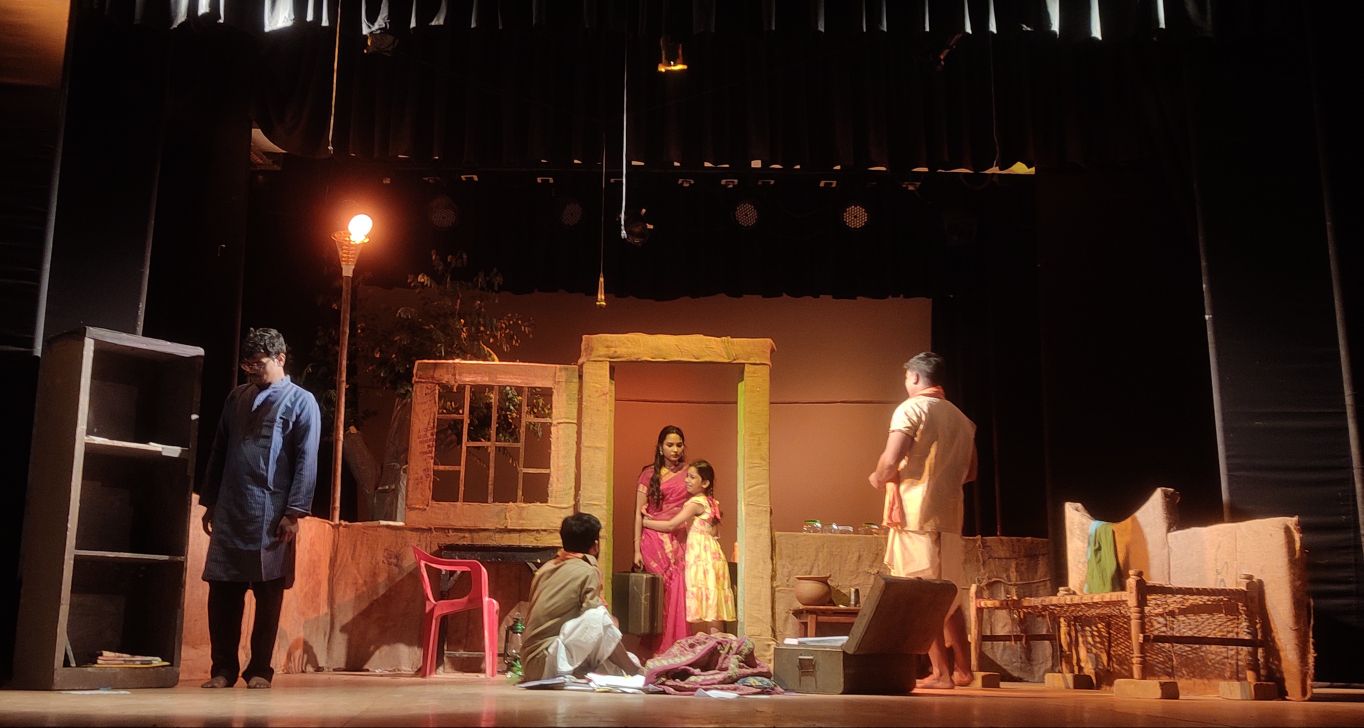Bhubaneswar: As dusk fell on Monday, city theatre aficionados started arriving at Bhanjakala Mandap here in droves. The occasion was the inaugural evening of the five-day-long theatre extravaganza ‘Natya Lahari’, organized by ‘Bidyakanak Srujjananusthan’, one of the premier cultural organisations in the state.

After the ceremonial lighting the lamp ceremony attended by eminent personalities like Lala Biren Ray, Himanshu Khatua, Bhaskar Jena, and Samar Mudali, the curtains parted to a thunderous round of applause, suggesting the excitement and anticipation.
Penned by Pranabandhu Kar in 90s and directed by Jagdish Prasad Maharana, ‘Ashanta’ tugged at the heartstrings with its gripping storyline. It painted a vivid picture of Subhendu Sekhar Mohanty, a once-respected English lecturer-turned-playwright, who now lives in penury in a city slum. His bond with little Lachhmi—the daughter of a reformed gunda turned tea-seller—formed the emotional core of the narrative.
As the play unfolded, audiences were drawn into the Subhendu’s world of broken dreams. Subhendu was working as an English lecturer and had a beautiful wife Ratna. Due to his passion for writing plays, he resigned from his job. This passion also forced his wife to desert him.

Since then he lives in a slum of a city where Lachhmi, a nine-year-old girl takes care of him. Lachhmi is daughter of Dhani Singh, who was once a goonda but now, since Lachhmi;s birth, is living a normal life. Every morning, Lachhmi comes to Subhendu’s house with a cup of tea and they often have sibling-like quarrels.
With no job and no publisher showing interest to publish his manuscripts, he lives in penury. A municipality staff Sadei’s job is to refill kerosene oil in the street lights. He has installed a lamp with a clearer glass near Subhendu’s house so that he can write. The former also fills kerosene oil in the latter’s lantern. Despite all these hardships, Subhendu keeps writing plays, but in pseudo name of Shankar and it is Subhendu’s friend Bhabani Shankar Das who tries to get his plays published so that his friend can get some money.
One day, two college-going girls Rupa and Namita arrives in his room, asking for donation for flood affected people in Balasore. Thereafter Rupa frequents his house and comes to know the background of Subhendu. Before long, she loses her heart to him and dreams of tying the knot.

Meanwhile, a play staged in the city turns out to be a huge hit, leading to top publishers searching for who is Shankar. To their astonishment, Rupa spills the bean and tells that Shankar is none other than Subhendu himself. After coming to know it, the very publishers who once rejected his manuscripts, now make a beeline at his house, eager to cash in on his newfound fame.
Overwhelmed by Rupa’s affection and the publishers’ clamour, Subhendu makes up his mind to leave the slum. But just as he is ready to leave, Lachhmi appears, her eyes moist, asking whom she will serve morning tea to, or who will spar with her in their daily banter. One by one, Dhani Singh, Sadei, the landlord, and finally Rupa herself—with luggage in tow—turn up, making it harder for Subhendu to cut loose.
What follows next? Does Subhendu walk away from the slum, or does he surrender to Rupa’s love? For the answers, you’ll have to wait till the curtain rises on the next show.

All the actors did their best to give justice to their respective roles. Jagdish Prasad Maharana as Subhendu, Subhalaxmi Routray as Rupa, Suryakanta Panigrahi as Bhabani, Amardeep Mohanty as Dhani Singh and Subhankar Sahu as Sadei delivered exceptional performances. Yet, it was little Nainshy Nainika Mishra, a Std IV student making her stage debut as Lachhmi, who stole the show with her effortless charm and heartfelt performance. Secretary of Bidyakanak Srujananusthan, Subhakanta Padhi did a guest appearance as Binayak Mohanty, a proprietor.
An alumnus of Utkal Sangeet Mahavidyalay, Jagdish Prasad Maharana ensured that every detail—entry, exit, stage craft, and pacing—was finely honed. The thunderous applause at every blackout bore testimony to the play’s impact.
To be mentioned here, Maharana, the joint secretary of Bidyakanak Srujjananusthan, has done PG in drama (design and direction) and his successful plays include ‘Alia Bhitare Kalia’, ‘Anischitata Ra Suryasta’, ‘Ali Alok Albert’ and ‘Mahismati’.
Equally commendable were Rakesh Satpathy’s deft light design, Trimruti Arts’ stage craft, and Manas Kumar Parida’s evocative music, which together created a seamless theatre experience.
With Ashanta setting the tone, ‘Natya Lahari’ promised to be a feast for theatre lovers for the next four days.
On the stage:
Shubhandu: Jagdish Prasad Maharana
Bhabani: Suryakant Panigrahi
Dhani Singh: Amardeep Mohanty
Sadei: Subhankar Sahu
Sashikant: Manas Kumar Parida
Binayak: Subhakant Padhi
Banamali:Prajnadutta Sahu
Barendra: Rajesh Mallia
Ramesh: Debasish Rout
Rupa: Subhalaxmi Routray
Namita: Kajal Rani
Lachhmi: Nainshy Nainika Mishra
Off the stage:
Light: Rakesh Satpathy
Stage: Trimurti Arts
Dress & Make Up: Mama Chitralaya
Music: Manas Kumar Parida




